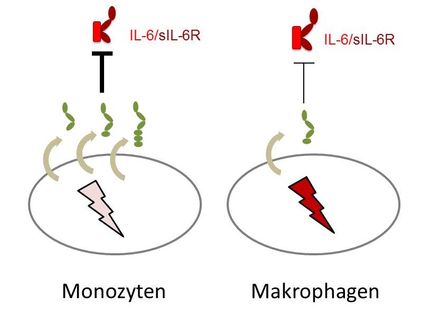Cellular “power plants” control inflammation
Researchers discover how mitochondria not only produce energy but also influence inflammation
Whether cells in the human body survive or die under stress depends, among other things, on their mitochondria. Scientists at the Faculty of Medicine at the University of Freiburg have now shown that a sudden stop in energy production in these cell “power plants” prevents normal cell death or so-called apoptosis and instead triggers an inflammatory response. The results of this research were published in the journal Immunity on 20 November 2024.

Prof. Dr. Olaf Gross.
Jürgen Gocke/ Universität Freiburg
“We found that mitochondria provide a kind of decision-making aid: they regulate whether a cell undergoes clean, silent apoptosis or releases pro-inflammatory messenger substances,” explains Prof. Dr Olaf Groß, head of the study, a scientist at the Institute of Neuropathology at the Medical Center – University of Freiburg and a member of the Cluster of Excellence CIBSS – Centre for Integrative Biological Signalling Studies at the University of Freiburg. “This finding helps us to better understand how the body maintains a balance between cell protection and defence mechanisms. This could open up new avenues for the treatment of inflammatory diseases.” The research work was funded as part of several collaborative research centres at the University of Freiburg.
A complex interplay for good health
The universal “fuel source” for cellular activity is ATP (adenosine triphosphate). If the ATP in the mitochondria drops sharply, a protein important for apoptosis, known as cytochrome c, remains trapped in the mitochondria and the cell does not die, even if it receives the signal to do so from outside. Instead, the mitochondria activate mechanisms that trigger an inflammatory response, which puts the tissue on alert and prepares it for a possible threat.
The researchers have now discovered that a special “sensor” in the cells, known as NLRP3, is activated when the mitochondria cease energy production. However, a second signal from other areas of the cell is needed to activate the NLRP3 sensor. This so-called “two-signal mechanism” ensures that inflammation is only triggered in the event of serious danger, thus protecting healthy cells. This enables the body to react to threats in a targeted manner while at the same time preventing unnecessary inflammation that could damage the tissue
New options for treating inflammatory diseases
This discovery could be helpful for the treatment of diseases in which inflammatory processes play a role – such as gout, type 2 diabetes or severe cases of COVID-19.
“In the future, drugs could be specifically designed to mitochondria or the activation of NLRP3 in order to better control inflammation and, on the one hand, to prevent damage to healthy tissue and, on the other, to promote the immune response to infection or the rejection of cancer by the immune system,” explains Prof. Dr. Olaf Groß.
Original publication
Saller, Benedikt S. et al. (2024): Acute suppression of mitochondrial ATP production prevents apoptosis and provides an essential signal for NLRP3 inflammasome activation. Immunity
Original publication
Saller, Benedikt S. et al. (2024): Acute suppression of mitochondrial ATP production prevents apoptosis and provides an essential signal for NLRP3 inflammasome activation. Immunity
Organizations
Other news from the department science

Get the life science industry in your inbox
By submitting this form you agree that LUMITOS AG will send you the newsletter(s) selected above by email. Your data will not be passed on to third parties. Your data will be stored and processed in accordance with our data protection regulations. LUMITOS may contact you by email for the purpose of advertising or market and opinion surveys. You can revoke your consent at any time without giving reasons to LUMITOS AG, Ernst-Augustin-Str. 2, 12489 Berlin, Germany or by e-mail at revoke@lumitos.com with effect for the future. In addition, each email contains a link to unsubscribe from the corresponding newsletter.


















































